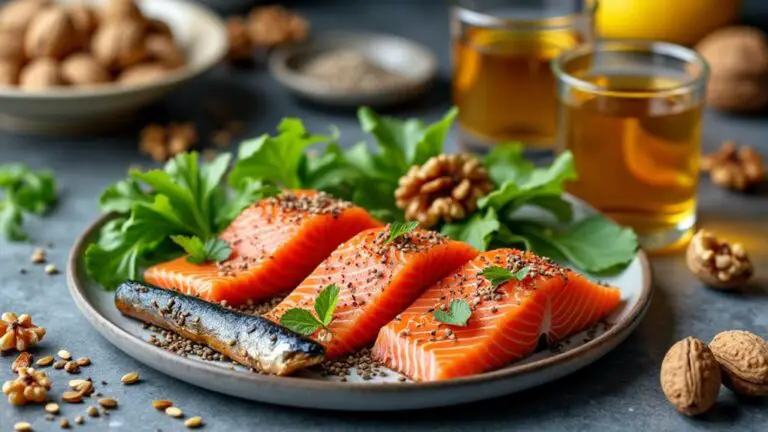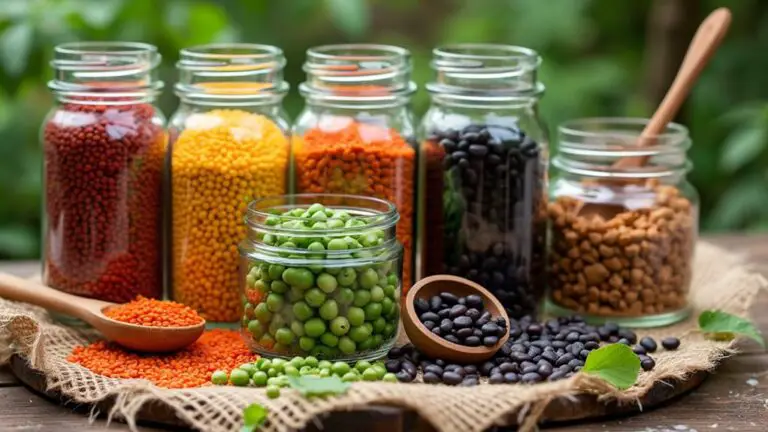Understanding the Basics of Skin Health: Nutrition and Care
Your skin's health depends on both nutrition and care. It's composed of layers that protect and nourish your body, requiring essential nutrients like vitamins A, C, and E, along with minerals and antioxidants. A balanced diet rich in these elements supports skin function and appearance. Hydration plays a vital role, so drink plenty of water daily. Protect your skin from environmental stressors, especially sun damage, by using sunscreen and wearing protective clothing. Gentle cleansing, moisturizing, and exfoliating are key habits for maintaining healthy skin. By understanding these basics, you'll be on your way to achieving a radiant complexion.
Key Takeaways
- Skin health depends on a balanced diet rich in vitamins A, C, E, and minerals like zinc for cell turnover and repair.
- Antioxidants from fruits and vegetables protect skin from environmental damage and premature aging.
- Omega-3 fatty acids improve skin hydration and reduce inflammation, found in fatty fish and flaxseeds.
- Adequate hydration supports skin cell function, improves texture, and facilitates nutrient movement throughout the body.
- Daily habits like gentle cleansing, sun protection, and avoiding high-glycemic foods contribute to maintaining healthy skin.
Skin Structure and Function
Your skin, the body's largest organ, is a marvel of complexity and functionality. It consists of three main layers: the epidermis, dermis, and subcutaneous tissue. The epidermis, your protective barrier, is mainly composed of keratinocytes that aid in moisture retention.
Beneath it lies the dermis, housing collagen and elastin for strength and elasticity, along with blood vessels, nerve endings, and hair follicles essential for skin function.
Understanding skin structure is important for maintaining healthy skin through proper nutrition and care. The thickness of your skin varies across your body, affecting its resilience and sensitivity.
Essential Nutrients for Skin Health
Your skin's health relies on a variety of essential nutrients.
You'll benefit from vitamins A, C, and E for cell turnover, collagen synthesis, and antioxidant protection, while minerals like zinc and copper support wound healing and skin repair.
Don't forget about fatty acids and antioxidants, which play vital roles in maintaining skin hydration and protecting against oxidative stress.
Vitamins for Skin Health
Maintaining healthy skin goes beyond topical treatments—it's also about nourishing your body from within. Key vitamins play essential roles in skin health.
Vitamin A promotes cell turnover and skin repair, found in sweet potatoes and carrots. You'll find vitamin C in citrus fruits and bell peppers, crucial for collagen synthesis and protecting against oxidative stress.
Vitamin E, a potent antioxidant, shields skin cells from free radical damage and is abundant in nuts and leafy greens. Don't forget vitamin D, which supports skin cell growth and repair—you can get it from sun exposure and fatty fish.
Finally, zinc is important for wound healing and combating skin issues like acne. Include meat, legumes, and seeds in your diet for a zinc boost.
Minerals Supporting Skin Function
Minerals play an essential role in supporting healthy skin function, working alongside vitamins to maintain a radiant complexion.
You'll find zinc, copper, selenium, magnesium, and manganese particularly beneficial for your skin's health. These minerals contribute to various aspects of skin care:
- Zinc aids wound healing and skin integrity.
- Copper enhances skin elasticity and repair.
- Selenium protects skin cells from oxidative stress.
Magnesium supports skin barrier function and hydration, while manganese assists in collagen production and antioxidant defense.
To guarantee you're getting these essential minerals, incorporate a variety of foods into your diet, such as:
- Meat, legumes, and nuts for zinc
- Seafood and whole grains for copper and selenium
- Green leafy vegetables for magnesium and manganese
Fatty Acids and Antioxidants
Beyond minerals, fatty acids and antioxidants play a key role in promoting skin health. Omega-3 fatty acids, found in fatty fish and flaxseeds, improve skin hydration and reduce inflammation. Omega-6 fatty acids, present in evening primrose oil, help maintain your skin's barrier function. These essential fatty acids contribute to a healthier complexion and prevent moisture loss.
Antioxidants like vitamins A, C, and E protect your skin cells from oxidative stress and free radical damage, which can lead to premature aging. You'll find these skin-supporting nutrients in berries, artichokes, and beans.
Don't forget about selenium, present in Brazil nuts and whole grains, which helps reduce oxidative damage from UV exposure. By incorporating these fatty acids and antioxidants into your diet, you're supporting your skin's health and resilience against environmental stressors.
Antioxidants and Skin Protection

Antioxidants are your skin's best defense against environmental damage and premature aging.
You'll find these protective compounds in a variety of colorful fruits, vegetables, nuts, and whole grains.
While eating antioxidant-rich foods supports your skin from within, applying topical antioxidants can provide an additional layer of protection against free radicals and UV damage.
Antioxidant-Rich Foods
Your skin's secret weapon against aging and damage lies in the power of antioxidants. Foods rich in these protective compounds can greatly boost your skin health and appearance. By incorporating a variety of colorful fruits and vegetables into your diet, you'll harness their antioxidant properties to combat oxidative stress and promote collagen synthesis.
To maximize your skin's defense against environmental factors, focus on consuming:
- Berries (blueberries, strawberries)
- Artichokes
- Beans
These antioxidant-rich foods not only help protect your skin from UV damage and pollution but also contribute to improved skin elasticity and hydration.
Their anti-inflammatory properties can reduce the appearance of fine lines and wrinkles, giving you a more youthful complexion.
Topical Antioxidant Benefits
Through topical application, antioxidants offer powerful protection for your skin. Incorporating topical antioxidants, such as vitamins C and E, into your skin care products can shield your skin from oxidative stress caused by free radicals.
These powerful ingredients help reduce inflammation, improve overall skin texture, and enhance hydration. Regular use of antioxidant-rich creams and serums can promote a clearer complexion and alleviate conditions like acne and rosacea.
When combined with sunscreen, topical antioxidants boost UV protection, minimizing the risk of sun-related skin damage. They also work to brighten your skin tone, reduce hyperpigmentation, and even out discoloration over time.
Hydration's Role in Skin Care
At the heart of radiant skin lies proper hydration. Your skin's health depends on adequate water intake, with about eight glasses daily supporting ideal skin cell function.
Proper hydration improves skin texture and tone, facilitating nutrient movement and toxin removal. It's not just about quantity; water quality matters too. Hard water, rich in minerals, may benefit your skin more than softened water.
Here's how hydration contributes to skin health:
- Promotes efficient sweating, cleansing your skin of impurities
- Prevents clogged pores and acne formation
- Enhances overall skin function and appearance
Consistent water intake is essential for achieving a clear, healthy complexion.
Diet's Impact on Skin Conditions

Over the years, research has consistently shown that what you eat profoundly impacts your skin's health. A diet rich in antioxidants, like vitamins A, C, and E, shields your skin from free radical damage, potentially preventing premature aging and various skin conditions.
Omega-3 fatty acids support your skin's barrier function and reduce inflammation, benefiting conditions like eczema and psoriasis. However, high-glycemic foods can worsen acne by increasing insulin levels and sebum production.
Nutrient deficiencies, especially in vitamins A and D, may lead to dryness, acne, and increased sensitivity. It's vital to maintain a balanced diet and avoid processed foods that contribute to the formation of advanced glycation end products.
Don't forget the importance of hydration; insufficient water intake can lead to dehydrated skin, making it more prone to irritation and exacerbating conditions like dermatitis.
Daily Habits for Healthy Skin
Maintaining healthy skin requires more than just occasional treatments; it's about cultivating daily habits that nourish and protect your skin. Start by using gentle cleansers no more than twice a day to remove impurities without irritating your skin.
Follow up with moisturizers to lock in hydration, especially after bathing. Don't forget sun protection; apply broad-spectrum SPF 30+ sunscreen 15-20 minutes before sun exposure and reapply every two hours.
For ideal skin health, incorporate these habits:
- Stay hydrated by drinking at least 2 liters of water daily
- Exfoliate 1-3 times a week to promote cell turnover
- Eat a balanced diet rich in antioxidants, whole grains, and skin-friendly foods
Conclusion
You're now armed with the knowledge to be your skin's best ally. Like Narcissus gazing at his reflection, you'll want to admire your glowing complexion. Remember, your skin's a living tapestry, woven from the nutrients you consume and the care you provide. By nourishing it from within and protecting it from without, you're not just maintaining skin health—you're crafting your own fountain of youth. Embrace these habits, and you'll radiate confidence and energy.







